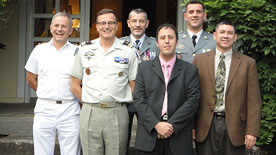Of bagpipes and capacity-building in Africa
NATO’s military liaison officer to the African Union talks of his experiences
Colonel Marc Forterre has travelled a lot to the African continent in his role as a NATO liaison officer to the Africa Union (AU), but playing the bagpipes to an unsuspecting Ethiopian customs officer in Addis Ababa airport is definitely one of his more unique experiences of life as a Senior Military Liaison Officer.

“The first thing that the female customs officer spotted in my trunk was the standard French Army rifle pouch which I normally use to store my bagpipes,” says Colonel Forterre. He explains that the normal X-ray machine was broken, so he had been taken to a random storage facility to have his bags checked manually.
“She automatically switched from an open and friendly attitude to something more suspicious,” he says. “When she unzipped it and discovered the pipe salad that was in it, her look darkened further.”
In a last ditch attempt to avert this suspicion, keen bagpipe player Colonel Forterre found himself playing a tune to show the confused customs officer that his instrument was not a weapon.
“Africa being what it is, the noise was high, the temperature hot and everything was very colourful,” he says. The sound produced was so unusual that everyone stopped what they were doing to look at him. “In the nick of time, people started cheering, clapping their hands and dancing.”
His ten-minute impromptu concert now ranks as one of Colonel Forterre’s most unique memories of his twenty years playing the instrument. While he normally plays for friends and on special occasions, he has continued to practice the instrument since arriving in Ethiopia to lead the six-strong NATO team.
On a more serious note…

The Alliance started its capacity-building support to the African Union in 2005 and the African Standby Force in 2007 in an effort to develop the Union’s long-term peacekeeping capabilities.
“Capacity-building often refers to assistance that is provided to entities, usually societies in developing countries, which have a need to develop a certain skill or competence, or for general upgrading of performance ability,” explains Colonel Forterre.
Although the NATO-AU Liaison team is small, a number of NATO staff are punctually sent to Ethiopia on temporary missions to work with the African Union on a variety of issues.
NATO’s involvement with the African Union is more than simply building its capacities. “It delivers the military expertise that [the AU] needs to be able to conduct its military operations,” says Colonel Forterre, detailing the human resource, legal and organisational development work his team does.
“Everything is about understanding and assessing the needs of the African Union and being able to judge how NATO can use its own capabilities to provide the appropriate assistance,” he explains.
“The most important aspect of my role is liaising,” he says. He adds that every team member must have the ability to communicate and promote NATO expertise as well as being able to listen to people and understand their requirements.
Even though the team have integrated into the local community well, he adds that “the most difficult thing about this and any mission is to be separated from my loved ones for so long.”
NATO support for the African Union
NATO was requested by the African Union to help reduce some of the key deficiencies of its Darfur mission (AMIS) by staff capacity building in 2005. The Alliance helped move 32,000 of 45,000 AU troops and vehicles in and out of Darfur, as part of AMIS. This support ended following the transfer of AMIS to the United Nations-African Union hybrid force at the end of 2007. Since then, the AU has made similar requests for practical assistance.
“NATO has sought to keep a low profile in providing its support,” says Michel Soula, acting Deputy Assistant Secretary General for NATO’s Operations Division. “Ultimately, NATO’s key aim has always been to encourage and assist towards African solutions to African problems, and hence its support to the AU has been driven by the principle of African ownership, with assistance provided exclusively on the basis of the AU requests and needs.”
The Alliance’s new Strategic Concept emphasises the importance of NATO’s partnerships with a wide range of non-member countries, as well as with international and regional organisations such as the African Union, with a view to boosting international security. NATO’s AU support is currently mandated to run until June 2012.
“Currently [there] is a perfect match between what NATO can offer and what the AU needs,” adds Soula. “NATO has a comparative advantage and a distinct and unique experience and expertise in building peacekeeping capabilities, which is of great use to the AU as it seeks to build its own.”
